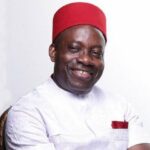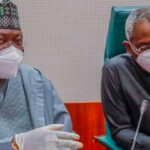
When last seen advertising publicly, Minister of Works and Housing Babatunde Fashola was playing detective in Lagos. It was after the tragic #EndSARS protests and the former governor was captured on video deftly picking up a large piece of evidence that had been “invisible” to the human eye—any human eye—until his.
He then vanished and would not make himself available to questions or to claim his public applause. Even at Christmas this year, he was still so shy about that event he did not appear to make his annual statement about his ministry’s achievements.
He has now terminated that period of silence, as this is the new season when all men of goodwill and good sense in his ruling APC must come out of hiding and hone the path into the future.
In that connection, and during his silence, his former benefactor and boss, Ahmed Bola Tinubu, swimming in a sea of questions as treacherous as the distance from Lagos to Abuja, announced that he wants to be the next president.
Appearing in public at an APC event last Thursday, Fashola, who knows the political forcefield of Tinubu better than any politician, declared that on infrastructure, the government of which he is a part has accomplished what the US government is “struggling with.”
Fashola, it might be remembered, was thought so highly of by Buhari in 2015 that he gave him three ministries, including power. That one was deducted in 2019 when it became clear that Fashola’s bark—which included open ridicule for any government which could not provide electricity for all Nigerians “within six months”—was nowhere near his bite. Were Buhari to have a third term, Fashola might have had only the Ministry of Housing left.
How did he describe the situation? “From six years ago, this government led by President Muhammadu Buhari, as far as infrastructure is concerned, has been doing what the United States government is still trying to do; they (in the US) are still trying to pass their infrastructure bill and they are still fighting.”
[Actually, Mr Fashola, the Joseph Biden administration arrived in power five years after yours.]
But the minister boasted: “As at December 2021, we had completed 941 kilometers of roads across all states and geopolitical zones,” he said.
941 kilometers in seven years means that even if that were true—and there is no evidence—his government has achieved a paltry construction rate of just over 100 kilometers per year nationwide. That is an embarrassment rate of less than four miles per state per year!
But given that he was speaking in a particular state, he chose that one for his example. “In Kano State here for instance, there are 21 road projects either in, around or in the neighbouring communities,” he said.
And for rhetorical effect, he asked: “Before [the] APC administration, when last do you remember [the] Federal Government completing [a] 50-kilometer road in any part of the country?”
It was a loaded question, almost as loaded as his most famous line before APC assumed political control in 2015: that a serious government would fix Nigeria’s electricity troubles within six months.
According to Fashola in a related statement at the 7th Bola Tinubu Colloquium in June 2016, “We do not have power because power is difficult to generate. We have darkness because we have incompetent people managing our economy.” He has unsuccessfully walked back that statement ever since, and even paid for it by losing the power portfolio in 2019.
Nonetheless, I suppose that the people of Kano ought to be celebrating that in seven years, they have received 50 kilometers of roads from Buhari. If it were true—and again there is no evidence of it—Kano’s gift of seven kilometres per year is almost twice the national average.
But we must question the government even more intensely than this. During Fashola’s hibernation at Christmas, Clem Agba, the National Planning Minister of State, announced that in 2021, the Federal Government constructed over 500 rural roads.
Mr Agba, just like Fashola last week, was only too eager to invoke Buhari’s name, saying that the president was focused on the “critical infrastructural development of all rural communities.”
But he did not bother to provide any evidence, and Fashola has not acknowledged this claim. There is no list of such an achievement on the website of the presidency. Or the Ministry of National Planning. Or on Fashola’s Works and Housing. With this government, there is rarely concrete information about the completion of any project, and always nothing about completion on schedule. Where are the lists of these roads, Fashola?
The Minister was again scrambling at the end of last week to rephrase his sycophantic babbling, saying he was merely talking about how the American government is unable to obtain infrastructure approval from the legislature, something that the Buhari government achieved a long time ago.
The question is: if you have enjoyed this precious approval, what have you done with it: 941 kilometers in two terms of office? Why have you failed to live up to every promise and every claim? Why has the country deteriorated so alarmingly in your hands?
Fashola has clearly not learned the power of thought before talk. Among others, he is on record as having stated that Nigeria’s electricity is not the problem of the government, and that (given that he is the minister), Nigerian roads are not as bad as they infamously are.
That said, even if he does not want to tell Nigerians how on earth a government of such loquaciousness and free-spending habits constructs a miserable 941 kilometers in seven years, accountability demands that he list these roads for Nigerians to confirm that roads they cannot see have not been built in their communities. Where are these roads, Fashola?
And while he must also clarify how rural roads became the responsibility of the Federal Government, it is even more important to publish a list of them so that the people in whose communities and states they were built would know that they are there.
When Fashola has done that, I would be pleased to welcome him back to the public life from which he has been shying away lately. After all, some eight years ago, there were some who thought of him as a presidential prospect.
A lot of water has passed under that bridge. Which is why the potent question he ought to have answered first, not later, is what he really thinks of the presidential prospects of one Mr Tinubu, the man who gave him his governorship but almost denied him a second term.
This one stares every patriot and every member of the political elite in the face just as those eyes of Tinubu’s bore into the eyes of friends, fans, and foes.
Answer the question!
Copyright PUNCH.
All rights reserved. This material, and other digital content on this website, may not be reproduced, published, broadcast, rewritten or redistributed in whole or in part without prior express written permission from PUNCH.
Contact: [email protected]





